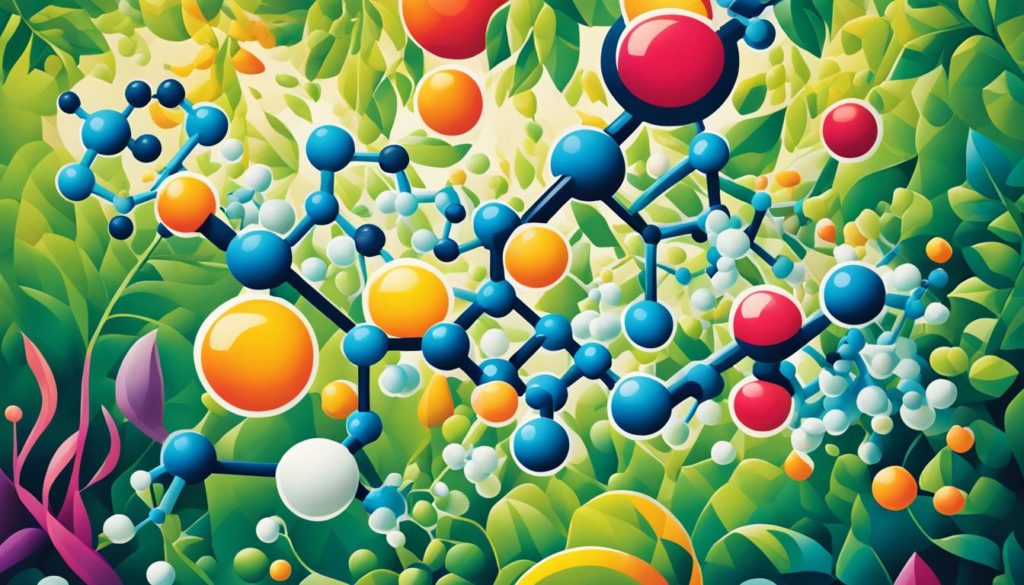L-Tryptophan is an essential amino acid that is crucial for our health. It helps make serotonin, which affects our mood, sleep, and how we think. People are interested in Tryptophan benefits and how it can be added to our diet or taken as a supplement.
L-Tryptophan is used for health issues like depression, trouble sleeping, and pain that doesn’t go away. But, it’s important to know both the good and the bad effects. Understanding everything about it helps people make smart choices about Tryptophan supplementation.
Key Takeaways
- L-Tryptophan is essential for producing serotonin.
- Tryptophan benefits include mood regulation and sleep improvement.
- It is used to manage depression, insomnia, and chronic pain.
- Understanding both benefits and side effects is crucial.
- Supplementation requires informed decision-making based on existing research.
What is L-Tryptophan?
L-Tryptophan is an essential amino acid our bodies need but can’t make by themselves. It’s a critical part of proteins, based on the L-Tryptophan definition. We must get it from what we eat. This nutrient helps in many important body functions, like making proteins.
It’s needed to make serotonin, a chemical that affects our mood and sleep. L-Tryptophan also helps make niacin (vitamin B3) and melatonin. These help us sleep and wake up properly.

L-Tryptophan is key for cell repair and staying healthy. Foods like poultry, dairy, nuts, and seeds are good sources. Knowing its role in making proteins and other vital substances shows its dietary value.
Here’s a quick look at L-Tryptophan’s importance:
| Role | Function | Sources |
|---|---|---|
| Essential Amino Acid | Building block for proteins | Poultry, dairy, nuts, seeds |
| Precursor to Serotonin | Mood regulation and sleep quality | Poultry, dairy, nuts, seeds |
| Niacin Production | Converts to vitamin B3 | Poultry, dairy, nuts, seeds |
Health Benefits of L-Tryptophan
L-Tryptophan is a key amino acid that affects many parts of the body. It helps improve how we think and feel and assists in getting good sleep. This section will explore the benefits of L-Tryptophan for our health.
Improved Sleep Quality
L-Tryptophan is great for those needing a sleep boost. It creates melatonin, which controls our sleep patterns. People who have trouble sleeping or suffer from sleep issues may find L-Tryptophan very helpful.

Mood Regulation
L-Tryptophan plays a critical role in mood regulation by turning into serotonin in our brains. Serotonin is a key player in how we feel emotionally. Adding L-Tryptophan to our diet can help in handling depression and anxiety better.
Enhanced Cognitive Function
Apart from aiding sleep and mood, L-Tryptophan is beneficial for the brain. It’s necessary for making important neurotransmitters and proteins. These are crucial for memory, learning, and overall brain health.
| Benefit | Mechanism |
|---|---|
| Sleep Aid | Precursor to melatonin, regulates sleep cycles |
| Mood Regulation | Converted into serotonin, improves emotional stability |
| Cognitive Enhancement | Supports neurotransmitter synthesis, boosts brain function |
L-Tryptophan for Sleep Improvement
L-Tryptophan is key for better sleep. It is an essential amino acid. It helps by turning into serotonin and melatonin. These help regulate our sleep cycle, ensuring a peaceful night.
Turning L-Tryptophan into serotonin and melatonin involves several steps. Once in the body, it changes into 5-hydroxytryptophan. Then, it becomes serotonin. This neurotransmitter is crucial for mood and turns into melatonin at night. Thus, L-Tryptophan helps us sleep better.
Studies say L-Tryptophan helps those with sleep problems, like insomnia. It boosts melatonin, helping fix our sleep cycle. Adding L-Tryptophan to the daily routine might be a natural fix for sleep issues.
Choosing L-Tryptophan supplements could be good for those looking for natural options. Still, it’s best to talk to a doctor before starting them.
| Key Point | Description |
|---|---|
| L-Tryptophan Metabolism | Converts to serotonin, then melatonin, enhancing sleep quality |
| Research Findings | Beneficial for individuals with sleep disorders like insomnia |
| Supplement Use | Natural alternative to improve melatonin production and sleep patterns |
How L-Tryptophan Influences Serotonin Levels
L-Tryptophan is key in making serotonin, which helps balance mood. Eating more L-Tryptophan can boost serotonin, improving mood and lessening anxiety. This section looks into how L-Tryptophan, serotonin, and mental health are related.
The Role of Serotonin
Serotonin plays a vital role in mood and memory. Keeping it balanced is crucial for emotional health and thinking clearly. Studies show that changing tryptophan levels can affect serotonin. This can help control mood and tackle mental health issues.
Connection to Mood and Anxiety
L-Tryptophan and serotonin closely relate to mood and anxiety. Higher serotonin from more L-Tryptophan can ease mood problems and anxiety. This shows how important neurotransmitter balance is for mood. Many studies point out that adjusting serotonin with L-Tryptophan helps people dealing with mood swings or anxiety. More on these studies is available in this research article.
It’s essential to understand the link between L-Tryptophan, serotonin, and our brain chemicals. This link is why eating enough L-Tryptophan is key for mental health. It also shows why it might be used to help improve mood and decrease anxiety.
Top Food Sources of Tryptophan
It’s important to get enough tryptophan for your health. This nutrient helps make serotonin and boosts well-being. You can get these benefits by eating foods rich in tryptophan. This guide will show you both animal-based and plant-based sources.
Rich Animal-Based Sources
Animal proteins are great for tryptophan. Look for poultry, seafood, and dairy for a good amount. These foods also give you other important nutrients needed by your body.
- Chicken and Turkey: Great sources of tryptophan, with turkey especially known for making you feel sleepy after a big meal.
- Fish: Salmon, tuna, and sardines have lots of tryptophan. They’re good for your heart because of their omega-3 fatty acids.
- Dairy: Milk, cheese, and yogurt have tryptophan plus calcium for strong bones. To learn more about calcium, click here.
- Eggs: Eggs are full of nutrients including tryptophan, choline, and vitamin D.
Plant-Based Sources
If you prefer plants, there are many tryptophan options. These are great for vegetarians and vegans and still offer health perks.
- Seeds and Nuts: Pumpkin seeds, chia seeds, and peanuts are full of tryptophan. They also have fiber and healthy fats.
- Legumes: Chickpeas, lentils, and black beans have tryptophan plus plant protein and vitamins.
- Tofu and Tempeh: These soy foods are good for any diet. They provide tryptophan and lots of protein.
- Whole Grains: Oats, quinoa, and buckwheat offer more than carbs. They have nutrients like tryptophan that promote health.
Check out this table for a comparison of animal and plant tryptophan sources. It shows their tryptophan amounts and health benefits.
| Food | Type | Tryptophan Content (mg per 100g) | Nutritional Benefits |
|---|---|---|---|
| Turkey | Animal Protein | 410 | Rich in protein, B-vitamins, and low in fat |
| Salmon | Animal Protein | 335 | High in omega-3 fatty acids, vitamin D, and protein |
| Tofu | Plant Protein | 286 | High in protein, low in calories, contains iron and calcium |
| Pumpkin Seeds | Plant Protein | 110 | Good source of fiber, magnesium, and antioxidants |
Eating these different tryptophan foods will give you many health perks. It’s a good way to get nutrients without using supplements.
Recommended Dosage of Tryptophan Supplements
Finding the right tryptophan dosage is key for its benefits. The suggested daily intake depends on health goals and personal needs. Studies recommend these doses:
| Health Goal | Recommended Tryptophan Dosage |
|---|---|
| General Well-being | 250-500 mg per day |
| Improved Sleep | 500-1000 mg taken before bedtime |
| Mood Enhancement | 500-1500 mg daily, split into two doses |
| Clinical Depression | Up to 3000 mg per day under medical supervision |
When thinking about tryptophan supplements, consider your health conditions. People with liver or kidney issues should talk to a doctor first.
To help sleep and mood, begin with the smallest recommended dose. Increase slowly if needed. Taking your dose regularly is also vital for the best results.
To sum up, while there are guidelines, tailor the tryptophan dosage to fit your needs with advice from a professional. This ensures it works well and safely.
Potential Side Effects of L-Tryptophan
L-Tryptophan has many health benefits. But, it’s important to know about its potential side effects. This awareness ensures users can make wise choices.
Common Side Effects
Some people may experience nausea, dizziness, or upset stomach. Usually, these reactions are mild. They often go away as your body gets used to L-Tryptophan.
By managing how much L-Tryptophan you take, you can lessen these reactions. It’s key to stay safe while making the most of its benefits.
- Nausea
- Dizziness
- Gastrointestinal discomfort
Serious Adverse Reactions
While rare, some serious side effects can happen. For instance, mixing L-Tryptophan with other drugs that increase serotonin could cause problems.
If you feel very restless, see things that aren’t there, or have trouble moving, get help. It’s critical to talk to a doctor right away.
| Condition | Description | Recommendation |
|---|---|---|
| Serotonin Syndrome | A potentially life-threatening condition characterized by high levels of serotonin. | Seek immediate medical attention |
| Severe Agitation | Intense restlessness and anxiety. | Consult healthcare provider |
| Hallucinations | Seeing or hearing things that aren’t there. | Medical intervention required |
| Coordination Issues | Problems with muscle control and balance. | Contact physician immediately |
Keep an eye on how much L-Tryptophan you use. Be aware of any unusual symptoms. Always talk to health experts to get advice that fits you.
L-Tryptophan Reviews and Research
L-Tryptophan research has made big steps forward. It shows its value for health and wellness. Studies point to benefits for sleep, mood, and brain function.
Many studies agree: L-Tryptophan helps with better sleep and mood. One study in the Journal of Psychiatry and Neuroscience showed it boosts serotonin. This helps with mood and anxiety.
Both scientists and users speak well of Tryptophan. Thanks to amino acid research, we know it supports mental health. Experts like Dr. Philip Cowen from the University of Oxford back its use in clinic settings.
Users on sites like WebMD and Healthline share positive stories. They say it helps with sleep and reduces anxiety. These personal stories, along with research, highlight its growing use for wellness.
Look at the table below. It sums up some major findings:
| Study | Publication | Key Findings |
|---|---|---|
| Effects of L-Tryptophan on Sleep | Journal of Clinical Sleep Medicine | Improved sleep latency and quality in participants |
| L-Tryptophan and Serotonin Synthesis | Journal of Psychiatry and Neuroscience | Increased serotonin levels, enhanced mood |
| General Mood Enhancement | European Neuropsychopharmacology | Reduction in depressive symptoms |
Together, these studies back up the positive Tryptophan reviews. They strengthen its reputation as an important health supplement.
Conclusion
We’ve taken a deep dive into L-Tryptophan and seen how it helps with sleep, mood, and brain power. It’s clear that this amino acid is a powerhouse for better health.
This research shows that L-Tryptophan boosts serotonin, vital for staying happy and calm. It also points out the best sources of tryptophan, from meats to nuts, highlighting the need for a diet rich in this nutrient.
While examining potential downsides, the importance of being well-informed about its use was stressed. In closing, L-Tryptophan has many health perks, but future studies are important. It’s a key part of achieving whole-body wellness.
FAQ
What is L-Tryptophan?
L-Tryptophan is an essential amino acid important for making protein. It’s not made by the body, so we need to eat foods that contain it. It helps make serotonin and melatonin, important for mood and sleep.
What are the health benefits of L-Tryptophan?
L-Tryptophan can help you sleep better and lift your mood. It makes melatonin for sleep and serotonin for mood stability. Some research suggests it might help your brain work better too.
How does L-Tryptophan improve sleep?
L-Tryptophan turns into melatonin in the body. Melatonin controls when we sleep and wake up. People with sleep problems may find L-Tryptophan helps them rest better.
How does L-Tryptophan influence serotonin levels?
As a serotonin building block, L-Tryptophan boosts its levels in the brain. More serotonin means better mood and less anxiety. Eating more L-Tryptophan or taking supplements can achieve this.
What are some top food sources of Tryptophan?
Great sources of Tryptophan include meat like turkey, chicken, and fish. It’s also in eggs, dairy, soy, nuts, seeds, and leafy greens like spinach. Adding these foods to your meals can help meet your Tryptophan needs.
What is the recommended dosage of Tryptophan supplements?
People usually take 500 to 2000 mg of L-Tryptophan supplements daily. Needs can vary by person and health condition. Always check with a healthcare professional before starting any supplements.
What are the potential side effects of L-Tryptophan?
Some may experience upset stomach, headache, or feel sleepy from L-Tryptophan. While rare, serious effects like serotonin syndrome can happen, especially with certain medicines. Always talk to a healthcare provider about these risks.
What do recent reviews and research say about L-Tryptophan?
Latest research mostly backs L-Tryptophan’s roles in enhancing sleep and mood. However, scientists are still studying its full effects and safety. Ongoing studies are shedding more light on its uses and side effects.


